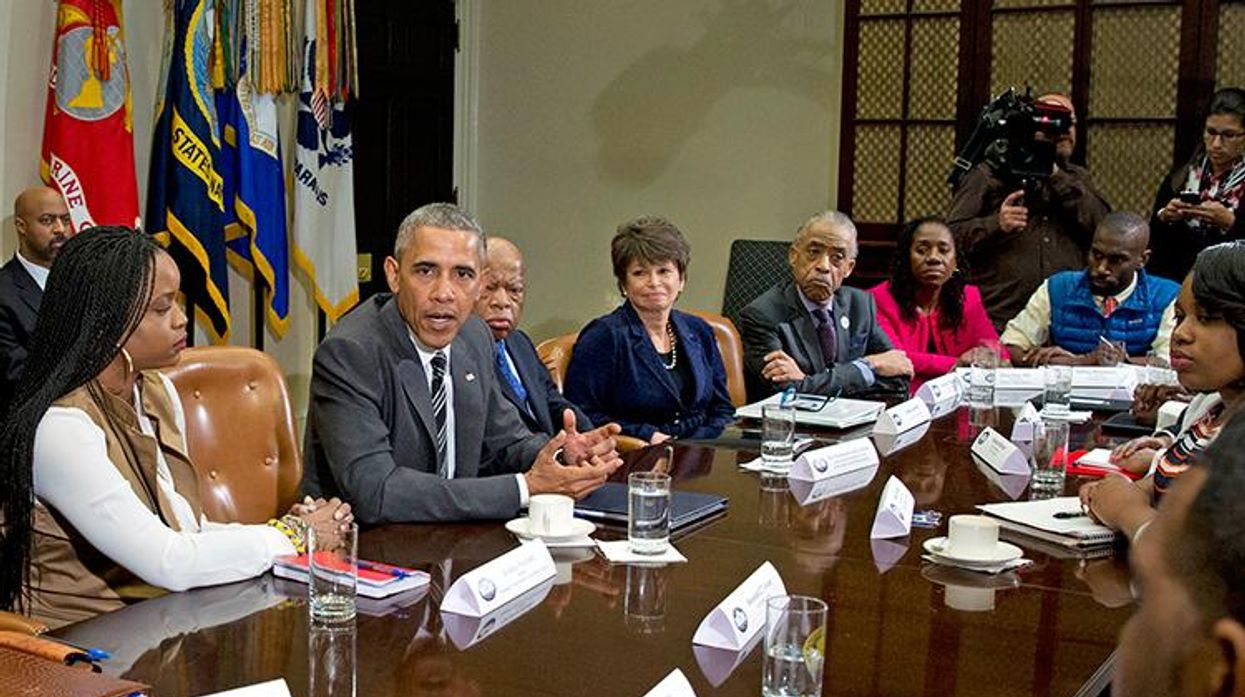Civil rights leaders representing a wide range of generations met with President Obama at the White House today for a Black History Month event that was billed as the first of its kind.
One reason the meeting was historic was because it included DeRay Mckesson, an out political activist and newly minted mayoral candidate in Baltimore, who left his job as a school administrator in Minnesota to help organize protestors in Ferguson, Mo., after a white police officer shot and killed unarmed black teenager Michael Brown. Since then, the 30-year-old activist has emerged as a prominent leader in the movement for black lives, specifically focusing on ending police brutality in America.
The first report on the meeting was from Mckesson himself, tweeting out relevant details and commentary, as Mckesson has earned a reputation for doing on the social media platform:
Mckesson tweeted that he and the president were joined by Obama Administration senior adviser Valerie Jarrett, U.S. Attorney General Loretta Lynch, acting assistant attorney general in charge of civil rights investigations Vanita Gupta, Obama senior adviser Cecilia Munoz, White House counsel Neil Eggleston and urban affairs director Roy Austin. Also present were Bernice King, daughter of Rev. Dr. Martin Luther King, Jr., and two of MLK's cohorts, the Rev. C.T. Vivian and Rep. John Lewis of Georgia. University of Missouri student organizer DeShaunya Ware, NAACP president Cornell Brooks and Rev. Al Sharpton also attended.
Aislinn Pulley, cofounder of Black Lives Matter's Chicago branch, told the Chicago Tribune she declined the invitation because she wasn't interested in being a part of "a photo opportunity and a 90-second sound bite for the president." Mckesson defended his attendance, and explained to his followers why he didn't live-tweet the meeting:
As to what they discussed, Mckesson tweeted this summary:
Mckesson, named in December to The Advocate's 40 Under 40 list, left his job as senior district administrator of human capital at Minneapolis Public Schools in August 2014. The Baltimore native loaded up his car and drove nine hours from Minneapolis to St. Louis, where he swiftly embedded himself with demonstrators protesting police brutality in Ferguson and the surrounding areas.
Among the civil rights projects he developed during that event and its aftermath was his latest project, Campaign Zero, which he describes as a "robust, comprehensive policy platform" that lays out 10 specific steps to end police violence in America.
Campaign Zero aims to address specific local, state, and federal policy, and advocate for changes that can decrease the number of casualties stemming from civilian interactions with law enforcement officials nationwide. It has given Mckesson and other members of the campaign's planning team opportunities for face-to-face meetings with some of the nation's most prominent politicians, including Democratic presidential hopefuls Hillary Clinton and Bernie Sanders, as well as U.S. Attorney General Lynch.
And today, he sat at the table with President Obama.




































































Charlie Kirk DID say stoning gay people was the 'perfect law' — and these other heinous quotes